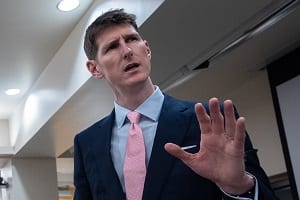More event photos can be found on the AGS Facebook page.
Event summary by Bo Carlson:
On Wednesday, March 20, Dr. Michael Morgan, Associate Professor of History at the University of North Carolina at Chapel Hill, gave a presentation to Duke community members about the 1975 Helsinki Final Act, reflecting on its role as a turning point in East-West relations during the Cold War. Although it is often forgotten today, Prof. Morgan argued that Helsinki reconciled the US and USSR’s two competing views of international order and shaped the end of the Cold War a decade and a half later.
Prof. Morgan began the talk by outlining the goals of leaders in the Western and Soviet Blocs prior to the conference. Soviet General Secretary Leonid Brezhnev and US President Richard Nixon looked to stabilize the East-West relationship and increase confidence at home in the midst of a global economic downturn. At the same time, French and German leaders Willy Brandt and Georges Pompidou sought to open Eastern Europe to the West. To pursue each of these goals, representatives of the US, USSR, France, Germany, and 31 other countries converged on Helsinki between 1972 and 1975.
After three years of negotiations, they reached an agreement. All parties to the agreement committed themselves to increased openness on topics of trade and migration. They made promises to uphold human rights, which increased pressure on the Soviet government from within and from abroad. Finally, both the East and West recognized that borders could be changed peacefully, paving the way for the eventual reunification of Germany.
Prof. Morgan’s discussion yielded several lessons that we can draw from the Helsinki Final Act to today’s issues. First, process matters. The Conference on Security and Cooperation in Europe required a consensus vote, which allowed minor participants such as Malta and the Netherlands to gain concessions by threatening to block more substantive issues. If the great powers had changed the rules to a majority vote, they could have avoided these obstacles, but the final agreement wouldn’t have had the same moral force. Second, international legal mechanisms can be effective ways to improve respect for human rights. When the US criticized the Soviet Union for its human rights abuses after Helsinki, the USSR could have simply withdrawn from the agreement. By that point, however, Brezhnev had already attached his political career to the agreement, and he couldn’t simply remove his government from the accords without weakening his credibility. Third, the “winners” and “losers” of international agreements aren’t always obvious. Journalists criticized President Ford for caving in to Soviet demands by signing the Helsinki Accords, but historians now consider almost every provision in the agreement to have been in the United States’ interests. As we consider the United States’ diplomatic efforts today to combat nuclear proliferation, protect its commercial interests, and stabilize areas of conflict, it’s important to keep each of these lessons in mind.


